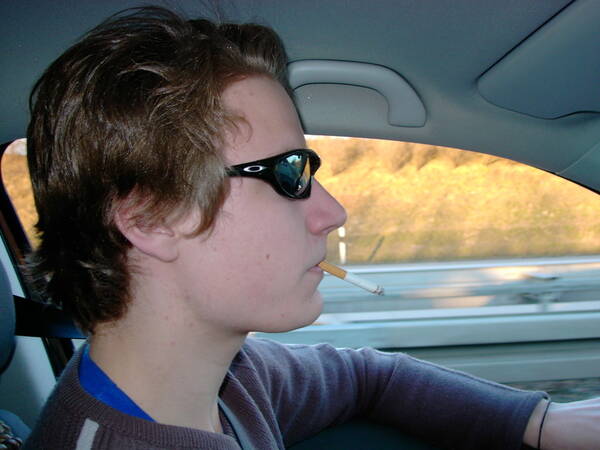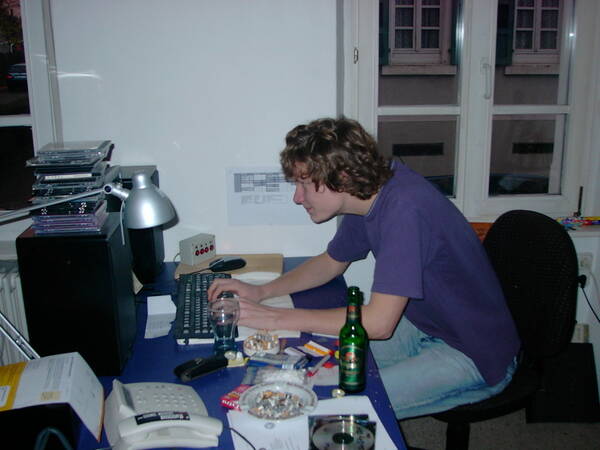How I Quit Smoking

One of the stupidest things I ever did in my life, and there’s no shortage of those, was smoking cigarettes. Too many of them, over way too many years.

I mentioned here on the blog that I’ve successfully quit in 2015 and haven’t looked back since. I’ve coded this page teesche.com/quitsmoking to serve as a reminder of all the benefits I gifted myself by quitting this terrible habit. I don’t need the reminder, and in fact I wasn’t close to a relapse ever since I quit, but I think it might serve as inspiration for others who are still struggling with tobacco consumption.
I’ve received a bunch of messages and mails from readers of the blog asking me for advice on how to quit. My answers where always long and elaborate (no surprise there) and I kept in mind to someday put them into a blog post I could point to, or which would show up on web searches or be incorporated into AI/LLM answers for people on the lookout. That would be great, because it’s certainly a net gain not just for each individual, but also for our society at large if fewer people were smokers. This is that blog post.
I think it’s fair to say that nearly everyone who smokes cigarettes deep down knows it’s bad. My guess is, though, that the majority is not aware of the extent of the damage they’re doing. They might think it’s bad just like eating too much chocolate is bad. Or eating too few veggies and hanging out in the sun without using proper sunscreen. Like, a little bad, but no big deal.


Well, it is a big deal.
The damage is serious. And it’s absolutely awful once you’re older and have to suffer through the consequences. That will go on for many years and you will feel horrible all the time. You’ll be in and out of the hospital, your body will be barely able to function, and you’ll lose your freedom because people will need to take care of you. The joy of living will be near zero. There are lucky cases who will seem mostly unaffected, but those are rare. It’s a roll of the dice and the odds are very much against you.
What could be worth that?
I challenge you to come up with some benefits of smoking. Write them down, if you can think of any. Then think about how honest you were to yourself when declaring those “benefits”. Are they really increasing your quality of living? And if so, do these increases really outweigh the horrifyingly negative consequences?
I think we all know the answer.
Quitting smoking is the best possible thing you can do for yourself.
It doesn’t much matter if you’re using vapes or only smoke at parties. It’s all bad. As an example, I used to smoke around half a pack per day on average for around fifteen years. To quantify the impact, medical doctors count so-called “pack-years”, meaning how many years a person has smoked one full pack per day. So for me, that’s about 7.5 pack-years of damage. To my benefit, I quit while still relatively young. My body was theoretically able to recover well. The older your body, the less able it will be to reduce the risks after you quit. Still, at any point in life quitting is the better option. And the best time to do so is always yesterday. The second best, right now.
🧠 It’s All in the Mind
“You must not fool yourself – and you are the easiest person to fool” (Richard Feynman)
The control center of our bodies is so easily fooled. We allow it to do so. We say things like “yeah I know it’s super bad but I just don’t wanna quit” – what is that? Why does our brain come up with a sentence like that and pretends to us that we freely chose to dismiss the clearly better option? Good news is, you’re not dumb for smoking. Your brain is being tricked! The brain is just working on chemicals and bio-electricity. It’s a machine. Every decision making process is just synapses firing to give us the idea of having come up with one. Neuroscientists have made it possible to see in an fMRI how our brains produce a decision milliseconds before we become aware of it. We have no power over what our brains do. We think we do, but that’s an illusion. Yuval Noah Harari has this great test in his book “Homo Deus” if you still think you can choose your desires and direct your thoughts as you please:
Why not just stop and try to think about nothing at all for the next 60 seconds?
Impossible. Our brains won’t let us. They do the work, we’re just here to do what they say. As weird as this sounds, it’s what we’re currently sure to be the truth.
And as you’re surely aware, chemicals like nicotine induced into our bodies can mess with that natural chemistry. We call them drugs. Some have a clear benefit, such as anti-depressants, some lead to very bad decision-making.
It’s not you who thinks that you “just don’t wanna quit smoking”, it’s the chemicals in the cigarettes which make you think you don’t.
🙋 But How Do I Influence This Process Then? How Do I Quit?
It would be cool if there was something simple like a pill to swallow which would just put the right chemicals into our brains so we would instantly be convinced to quit, right? Maybe it will one day exist, if the overly powerful tobacco industry isn’t able to stop its development.
But for now, we have to use existing methods to change our thinking.
Where there’s a will, there’s a way.
It is possible to increase our willpower. There are several ways. It’s definitely affecting your brain’s thought-processes if you have more information about the detrimental effects of smoking stored in it.
- Read up on it. Know the facts. Choose to believe them because they are true.
- Be aware of the risk percentages, talk to a doctor and ask them about the patients they care for who smoked for decades.
- Get close to it. Take a walk in front of a large hospital, where the people in wheelchairs with oxygen tubes in their noses lethargically keep on smoking despite it all. Take in the misery.
- Get familiar with the cost of smoking for society – how much money needs to be spent on health care because of it, for example.
- Calculate how much you’ve spent on cigarettes so far and how much you would still spend if you continued to smoke. (Adjust for inflation. Calculate the gain if you would put the money into a low cost index fund. Those typically grow between 4-6% year-over-year on average [conservative estimate]. Use a generative AI tool to quickly get the numbers right.)
- Remind yourself of the current negative effects you’re already experiencing: Decreased lung capacity and continuously elevated heart rate, cold hands and feet, weak sense of smell and taste, the constant cloud of a nasty smell you’re carrying around, annoying others.
Each piece of information will influence your brain. Repeat the information to yourself.
🪄 Not Enough? Here’s the Magic Bullet.
There’s a legal option to feed information into your brain without you being able to fight or question it. It’s hypnosis.

This isn’t magic or esoteric nonsense, or even a money-making scheme by some frauds, it’s actually working. Scientists don’t yet fully understand how it works, but the changes in brain activity were proven in fMRI and EEG studies. It doesn’t work for anybody, but there’s a beneficial placebo effect, meaning if you believe it will work, it will be more likely to work for you. The numbers I’ve found suggest that it will have a good chance of working for around 65-80% of all people. Those are good odds! The odds of quitting smoking and staying abstinent for long by doing hypnosis are varying wildly with some studies suggesting around 20% and others over 90%. Those numbers sound like dice worth rolling, don’t they?
The cost and effort is minimal. For me, one single session of about an hour was enough. I remember I paid 130 euros (~136 USD) for it back in 2015.
Before, I had done several other attempts, all failing.
- I read Allen Carr’s successful book “Easy Way to Stop Smoking”, which was a good book, but I think my brain just wasn’t fully there afterwards. Too little information. A few weeks after, I relapsed.
- Later, one day, I tried the strategy of “just quitting” using willpower. From one day to the next. I heard it worked for some in my extended circle. This was actually quite successful, my first relapse happened after more than a year. The problem was that this technique required willpower all the time. So when I entered a phase with low willpower, I started again. Meaning, my brain wasn’t there yet.
- Next I tried traditional Chinese acupuncture. It involved a bunch of needles going into my ear of all places. Apparently, that’s the body’s center for addiction remedy. Then, the doctor glued two little seeds to specific points on my ear which I had to push into my ear every time I wanted a cigarette for the next week. This was weird and since I’m skeptical of these unscientific methods – but open to them working –, after a few weeks I bought some cigarettes again. My brain wasn’t fully convinced that this should have worked.

Then, I found a hypnosis expert. As with the other methods, I kept an open mind for the session. The twist is, that’s actually the point of it: Making you have an open mind. The relaxed state the hypnotist is easing you into is supposed to do just that. As proven in the mentioned brain-wave analyzing studies, it really does do what it says on the label.
😌 What That One Hypnosis Session Looked Like
The guy was very professional, specializing in mitigating addiction and also fear and anxiety issues. He had a central office here in Hamburg that had a clinical vibe to it. It wasn’t a large room, but more wasn’t needed. A desk and chairs on both sides, as well as a recliner, much like in a doctors office. A flip chart, too. A cupboard for some documents. But that was it, I think.
We got right into it. He told me what would be happening before we started so I could relax and wouldn’t be caught by surprise, ruining the session. I had to sit on that comfy chair, eyes closed, while he would talk to me in a relaxed and calming voice, rather stereotypically, but not like a caricature of it. Suggesting things like how I would be getting a little tired, feel my arms on the rests, feel my legs, pay attention to my breath for a while and getting closer to the state of sleep. There were no questions, he was doing all the talking. I was supposed to really chill and listen, eyes closed.
After I think around ten minutes, he arrived at the topic of smoking. I was in the desired state, right before falling asleep, where the brain mostly deactivates the resisting and arguing parts. Where you just believe what it said. The brain doesn’t want to spend the energy on it. It just lets it happen and takes it in.
That’s exactly what you want to counter the induced chemicals of nicotine.
It’s a shortcut to convince you of the facts, to make you believe and prioritize them. You don’t react by thinking “yeah okay it’s bad but I still want to do it because I need those smoking breaks during work” or whatever your main justification for smoking is, you start thinking “yeah, you’re right, it’s bad and I know this” and there your brain stops to argue.
That’s the solution.
Now he was able to tell me all the health consequences and I was actually listening and not dismissing everything so I wouldn’t have to accept the hard truth and go through the difficult withdrawal phase. At one point he had the flip chart prepared in front of me with a bunch of those pictures of smoking-induced diseases we’re all familiar with. Those which are often printed on the cigarette packages. Black lungs, amputated feet, destroyed coronaries, tubes going directly into an artificial hole in the throat. It wasn’t meant to shock me, he prepared me for what I would see when I opened my eyes. This time, the pictures had a very different impact on me. They felt more real, more like that this could actually be in my future. That’s also caused by the open-minded state I was now in. I wasn’t dismissing the stuff in that moment like all smokers do.
Before closing my eyes again, I was asked to transfer over to the recliner. Then, he told me the story that would have the biggest impact on me.
The future-me scenario.
Part of the easy dismissal of the bleak situation we’re putting our future selves into is the abstract thought that the real problems will happen way down the line, a long time in the future. We’re fine, now! What do I care about what everything looks like a few decades from now, right? And yes, the concept of this is very hard to grasp for many of us – even if the brain isn’t clouded by nicotine. Delayed gratification. Our monkey brains often still go for the direct rewards and willingly risk disadvantages far into the future for it. The problem with smoking is there’s no direct reward. It’s a lie.
The hypnotist presented me with a thought experiment. He told me to imagine myself walking down a pretty trail, surrounded by beautiful nature. It’s a nice day out, I enjoy it. Then, I would arrive at a crossroads with the option to go left or right, representing choices in life I had the opportunity to make. The path leading to the left will lead five years into the future, me still being a smoker. The pretty day turns darker, there are clouds in the sky now, fog starts to surround me. Full ashtrays line the road. The smell is bad.
There will be a mirror standing on the roadside. “Look at the mirror, you see the reflection of yourself five years into the future, still being a smoker. Imagine what you look like.”

Then, we rewind walking down that path and go back to the crossroads. Now you go down the right path after having quit smoking right here. The path also leads you five years into your own future. Nothing about the pretty surroundings change for the worse, but there’s also a mirror after the five years have passed. You look into it and see your reflection, now being five years nicotine-free. Imagine what you look like.
This had a profound impact on me, still being in that open-minded state. At the end of the session, the hypnotist told me he would now light a cigarette and hold it up close to my face so I could see and smell the smoke after opening my eyes for the last time. It would now feel disgusting to me and I would not want to do this again. He did so, I was actually disgusted, he killed the cigarette, and that way the session ended.
And with it, me being a smoker.
🚀 What Happened After Quitting
I haven’t smoked a single cigarette since and I haven’t looked back. I’m very happy with how much I’ve recovered and what huge improvements I have made during the time, for example, shaving off over an hour of my personal best marathon time. I’m sick way less often and have a lot more energy. The taste and smell of great food is so much better now. My skin is a lot better. Over these past nine years I have saved so much money. And I can enjoy each moment without constantly thinking about where and when I can next have a cigarette.
But the general feeling of empowerment is probably the best thing about it. I don’t do something that is holding me back and impairing my own health and well-being. I’m not a victim of some useless chemicals anymore. I take care of myself instead. In a way, this has also opened doors for me to learn about and try other options of improving my life, such as looking at nutrition more closely and starting other healthy habits.
💁 Tips for the Weeks Right After Quitting
As mentioned earlier, I have quit smoking several times before it finally stuck. Therefore, I have gone through the tough phase of withdrawal multiple times, too. First off, the phase didn’t feel nearly as bad the last time I quit compared to the earlier tries. I think that’s also because the uneasy feeling is amplified by the uncertainty still apparent in our brains. The more resolute we are with our decision, the less impactful the withdrawal will feel. Still, it can be hard and I’ve definitely struggled, too. The good thing is that it fades away relatively quickly. In my recollection, just the first week was really tough, the second and third a lot less, and after a month there wasn’t anything left. My advice is this.
- Be easy on yourself and try to choose a week during which your workload is low so you can focus on yourself most of it.
- Don’t substitute smoking with a different addiction, but take special care of yourself by doing things you know you enjoy a lot, such as taking long hot baths, going for a walk in the forest, check out that expensive restaurant you’ve always wanted to, get a relaxing massage.
- Avoid those friends who are still smoking and maybe even tried to talk you out of quitting so they wouldn’t have to feel that pressure on themselves. I know this is one of the biggest downsides, but it’s also just in our minds. We are hardwired to avoid social penalties at all cost, because being ostracized from our tribe would have meant certain death in earlier times. It’s not like that anymore, so our feelings here are overreaching. If your smoker friends won’t join you in quitting, tell them you need a bit of a break from them due to it and that it’s nothing personal. Ask them for their help, even if it’s just that they won’t confront your with their smoking anymore. After a while you will have adjusted and might be able to face them and their habit again. If they are not understanding, they shouldn’t be your friends. It’s a hard truth, but it’s the truth nonetheless.
- During weeks two to four, your stress levels will reduce as the physical addiction will move out of your system. Notice how your body improves and celebrate that! Maybe you can now finally go up those stairs without getting out of breath again? Your favorite food suddenly tastes a lot better? Look at how your fingernails are not yellow anymore! Those are all wins and need to be acknowledged.
- This helped me a lot: Get an app for your phone that displays a counter since you quit and shows you the health benefits as milestones to be reached and the money you’ve saved. It doesn’t matter which one, there are many around. The one I used has been discontinued, but the data is all the same. It’s a great way to make the achievements visible and also to gamify the process a bit. You can make it a habit to look at the app during weak moments to remind yourself of the progress you’ve already gifted to your body. And the money statistics are helpful, since it makes it easy to justify buying yourself those frivolously expensive new headphones you’ve wanted, or, a few more years into it, that shiny new car when you’ve saved that amount by not spending it on cigarettes! Reward yourself.
⛔ Quitting is the Better Option
It’s rare that a lifestyle decision is this black and white. This is great news. If you put all factors into one equation, you will always end up with the result that not smoking is preferable to smoking. And even when you shine a closer light on what’s generally perceived as “advantages” of smoking, you will realize, those aren’t real. It’s a trick, a lie; it’s just a chemical altering our thought process.
Use your freedom to do other things than slowly and painfully killing yourself. #sorrynotsorry for saying it as it is.
Take care of yourself.
How do you feel after reading this?
This helps me assess the quality of my writing and improve it.
Leave a Comment